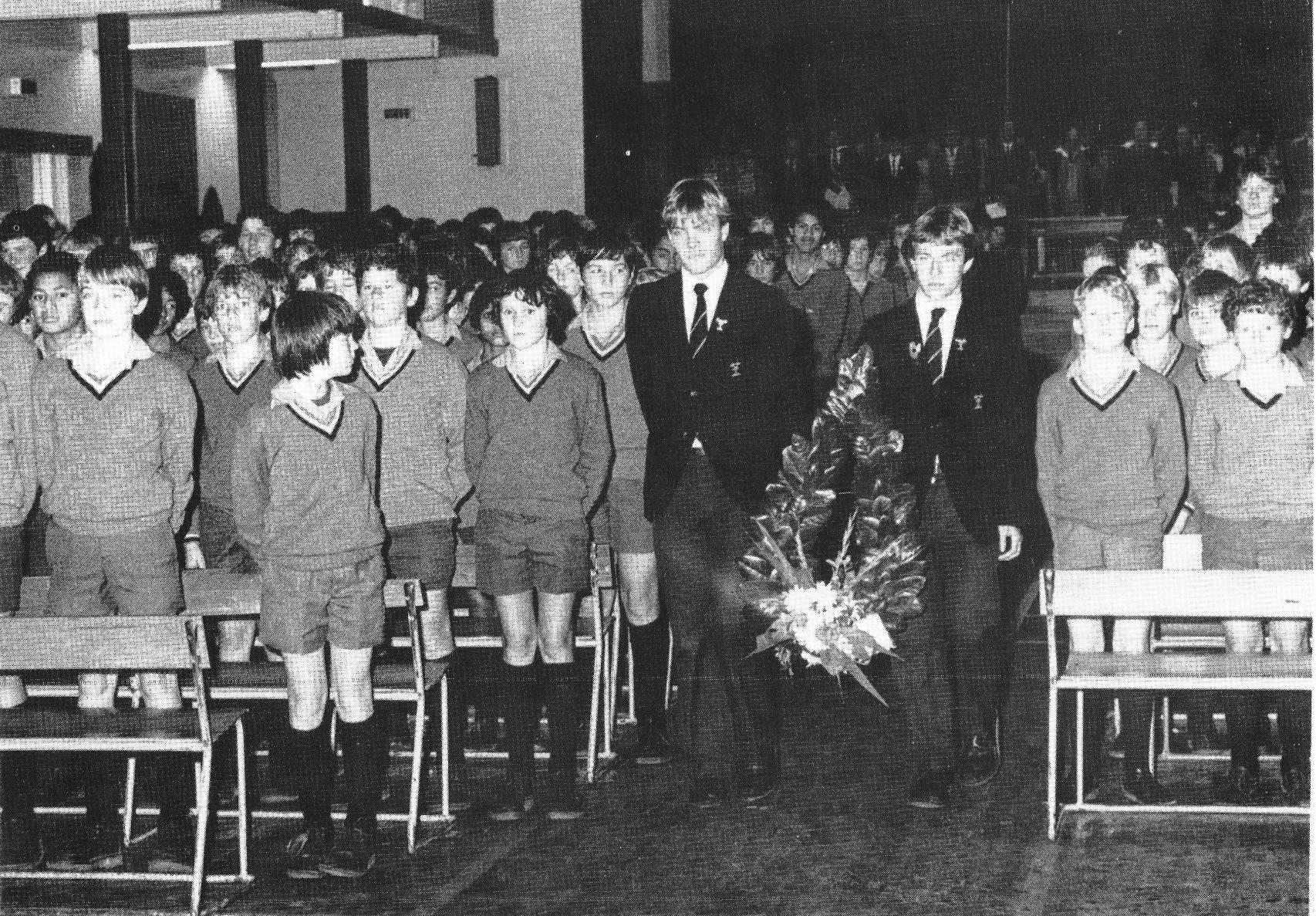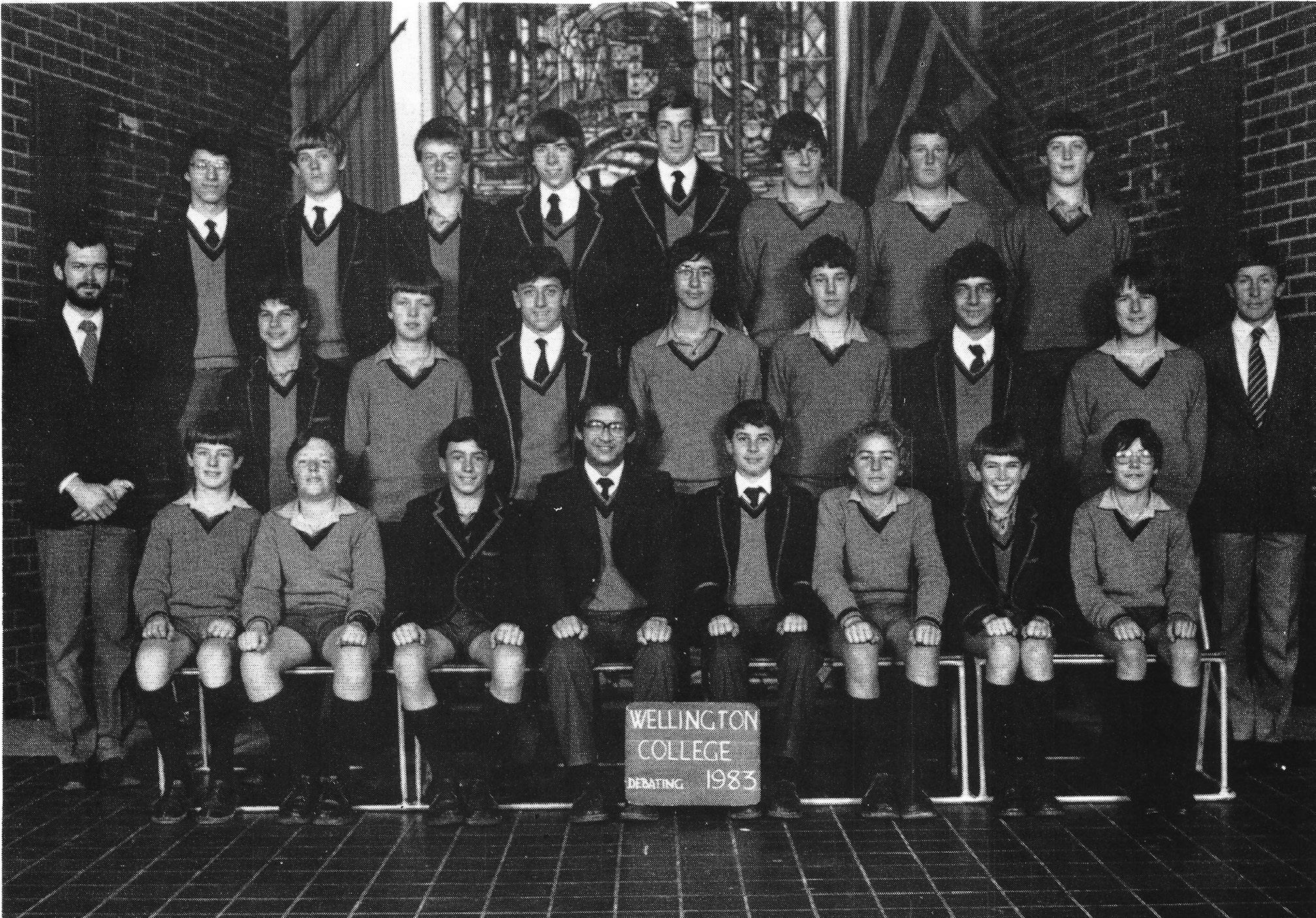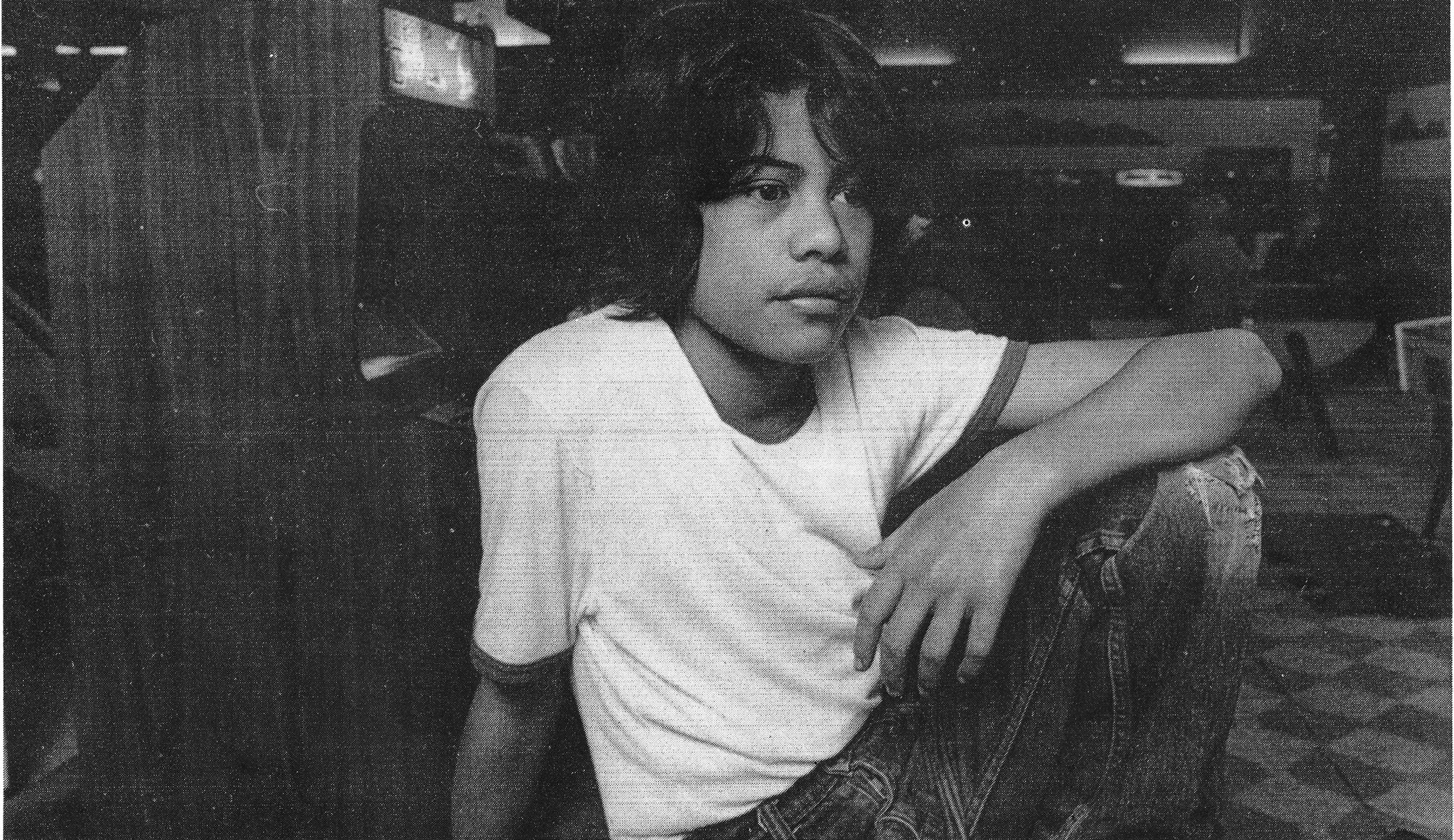
20 minute read
COLLEGE LIFE
Military Hierarchy
Wellington College Unit
Advertisement
The following list of staff names and ranks has been agreed to by the
Appeals associated with rank allocation must be in triplicate on form A78/12-9-1984. These forms must be signed by the appellant in presence of fellow officers— one rank above and one rank below present status. Said appeal must be in the hands of Appeals Board not later than the day after signing.
Note; Appeals Boards convene only once a year.
The Boards are constituted in the following territories: McMurdo Sound, North Island, South Island, Stewart Island and Falkland Islands on a year about rotation. For 1984 the Board will be constituted at McMurdo. Appellants must provide own transport and lodgings.
RANK ZONE OF INFLUENCE/OPERATIONS
General as adjutant all
Corporal as batman to Leader all Sergeant
Lieut. Bacteriological warfare (infect, rats etc.) P.U.
Major, in charge of R & R, Officers only
Captain, propaganda illustration, dispatches
Major, quarter mistress - pens, paper, wine, etc.
Sergeant, mech. eng. repairs to paper clips, etc.
Captain, interpreters, translation of English
Captain, entertainments
Lieut. Nuclear decontamination
Sergeant. Mess, other ranks
Captain. Mess, other ranks
Lieutenant, U.S. Marines Psychological Services
P.U.
Capt. Regimental Historian, ceremonial
P.U.
Lieut, Liaison N.Z. Navy and river fording
Capt. Maps and telling locations, other ranks
Capt. Mess and retirement funds
Lieut. Colonel, Bagpipe band, Limbo group
Sergeant Major, Met. Services (Balloons off tower)
P.U.
Capt. Creche services — officers only
P.U.
Lieutenant, delaying tactics
Lieutenant, amphibious landing equipment
Major. Anti-drug squad, anti-rugby terrorist
Lieut. Colonel. Welfare wives, other ranks
Capt. Propaganda illustrations (recruitment)
P.U.
Captain, S.A. army liaison (crowd control)
P.U.
N.A.
Capt. Welfare, Lieutenant rank only
Sub lieutenant, Medical health services
P. UP.
Lieut. Dispatches, carrier pigeons and mice
Lieutenant, U.S. Navy (nylons, cigs, coke etc.)
Lieutenant, dog handlers
Capt. Camouflage, smoke, shrimp netting
P.U.
P.U.
Chaplain (captain) Camp follower control
P.U.
P.U.
P.U.
P.U.
Colonel, counter-intelligence services
Mr J. D. Tate
Mr K. R. Tattersall
Mr M. R. Vaughan
Mr P. J. McA. Walls
Mr A. C. Yule

Ms K. Hanson
Mr S. G. Tamihere
Abbreviations: P. U. Politically unreliable R.R. Rest and recreation
S.A. South African
Corporal, Batman to Capt. Rankin
Lieut. Company records, patriotism inspiration
Lieut. Prefab, allocation
Political commissar, Capt. reserve in Red Felt Brigade, anti-urban terrorist control
Major, Maori Battalion, Maori insults
NOTE: All staff designated P.U. will be interviewed by KH within week following promulgation of this notice. Unsatisfactory or clear political deviance will result in immediate dismissal.
FIELD MARSHALL: Mr H. G. Rees-Thomas. Motto: Ich Dien. Special responsibility for Public Relations, flags and medals.
Young Rowers Save Elderly Man
Wellington College rowers, Philip Ansell, Warwick Brown and Craig Buchanan helped save an elderly man who fell off Tasman Wharf on October 16th, 1983.

Philip Ansell from 4AL was sculling back to the boating club when he heard an elderly man cry for help. On returning to the boating club he contacted Mr Bush (club member) to get help. Meanwhile, Warwick Brown and Craig Buchanan kyacked over to give the man any assistance he needed.
Members of the club arrived on the wharf and lowered some ropes to keep him afloat. Meanwhile, the club's coaching boat was on its way.
The St John's Ambulance and the coaching boat arrived at the same time.
Mr Alex Reinitz, 73, was then hauled into the coaching boat. He was taken back to the beach in front of theclub house where the St John's men took him to hospital. Mr Reinitz had been in the water some 20 minutes, before anyone heard him.
by W. Brown, C. Buchanan, 5AN
"FLYING COLOURS" FLAG COMPETITION
4A, with the assistance of Mrs Bradley, made a flag to enter in the "Flying Colours" competition. Our flag, made from yellow nylon folded over and sewn together with black pieces, represented sea, land and sky. Sewn by one of 4A, the flag was taken along to the Art Gallery by Mark Gibson and Russell Field. When handing it over they ran into a crew from Kaleidoscope, who chatted with them for a few minutes and actually did a section on the flag competition.
They were at the Art Gallery because there was a birthday exhibition. All the flags entered were flown on Saturday, 24th September. No-one won or lost as there were no prizes or places.
Edward Catherwood
We Stumbled On A Century
It was approximately 12.30 p.m. on Sunday, 22nd August, 1983, when I and my friend Michael were running down a muddy and very slippery path leading down from the National Museum and Art Gallery. All of a sudden I lost my footing and tumbled down a three metre bank.
Michael carefully followed me down to make sure I was unhurt. At the bottom I tried to get some of the mud off my trousers, when Michael picked up something that appeared to be broken glass. I immediately recognised it as kauri gum. We quickly gathered around 130 pieces of the gum. While doing so, we excavated a bone from a clump of grass. It wasn't just an old dog bone, there was a number on it. We took this with the gum, to my father. Then we rang "The Dominion" and they came around and took some pictures for a story. The photographers told us that we would be lucky if our story appeared in the newspaper because the Editor has to choose from over 50 stories. The next day we appeared in the newspaper.
We took the gum and bone to the museum director and as a reward we received a piece of gum, and a tour of the basement of the museum. We saw lots of amazing things which are generally not on display to the public.
In fact, only a fraction of the museum's treasures are on public display. What a way to start the August holidays!
B. Brucker 5S1
Ballroom Dancing
During the second term the Jimmy James Dance Studio conducted ballroom dancing lessons in the college hall on Friday nights. Approximately twenty senior boys were joined by girls from Wellington Girls' and St Catherine's Colleges.
The series often lessons was run by Mrs Joan Taylor in an informal and enjoyable style. The lessons concluded with a dance at the Jimmy James studio for ballroom dancing students from all Wellington Secondary Schools — an interesting and harmonious blend of the old-type dances learned during the term and the more familiar modern style.
Examinations were held for those who wished to enter, and Paul Dukes and Craig Johnson gained bronze medals in the Latin American section.


Chess
The Chess Club was more active this year than in previous years, due to the introduction of new chess sets and clocks, thanks to Mr Delceg (chess master).
Although chess is weaker in the college this year than last, Wellington College was represented in the Wellington school pupils' chess championship in May, where J. Herbert and G. Alexander just missed out on a prize.
During the second and third terms a large college chess team went to Rongotai College, where we drew the first match 31/2-31/2 games each, and won the rematch with a score of 5 to 3. Later on, a team consisting of J. Herbert, G. Alexander, T. Pledger and G. Simpson came first runners-up in the school pupil's teams tournament, to Hutt Valley High School. There were six other teams competing in this event.

Finally, in the Labour Weekend tournament, J. Herbert and G. Alexander gained third equal, to share the third prize ahead of G. Simpson, who started well but got no further.
J. Herbert
Community Service
Although somewhat scaled down compared with other years, boys from the college once again collected and starved. Indeed, there is many a suburban door with the imprint of a Wellington College fist upon it.
World Vision benefited to the tune of almost $400 from the 40 Hour Famine, while organisations such as
I.H.C., CORSO and Crippled Children saw door-to-door collectors from Wellington College. A new venture this year was assistance with S.P.C.A.
Probably the hardest work was done by a dozen sixth formers who carried heavy money boxes for "Birthright".
Their starting time was 7 a.m. on a July morning at the Railway Station.
I.S.C.F.
This year, as in others, the Wellington College Interschool Christian Fellowship group met on a Thursday lunchtime in Room 601 for a time of fellowship and Bible Study. There are about 25 boys altogether in the I.S.C.F group and we had a weekly attendance of about 15. The studies this year ranged over a variety of topics and were taken by a variety of people — staff, visitors whom we invited or who made themselves available, and some of the boys. The studies aimed at being both stimulating and challenging. The presentation of the musical "The Cross and the Switchblade" in the school hall was enjoyed by a fair proportion of the school.
In October we ventured forth up Mt Ruapehu with the I.S.C.F. group from Queen Margaret's. We had one tremendous days ski-ing and also spent some time at Turangi where we played the most original rugby game ever. This was followed by a well-deserved swim in the hot pools — all in all a great camp.
In 1984 we trust for the continuous guidance of God's hand upon the group and that more juniors will come along.
Debating
It was an excellent year for Wellington College debating. The Junior Premier and the Senior Certificate teams won their respective grades and other teams performed creditably and sometimes outstandingly.
The year began with the annual debates against Palmerston North B.H.S. The juniors spoke fluently but failed to negate adequately the motion "that New Zealand is full of sheep". However, the seniors squared the series when they affirmed "That we get the politicians we deserve". The annual debates against Wanganui Collegiate School, held in the middle term saw Wellington College run out the winner in both the senior and junior grades. In a school where the scent of royalty was still present (Prince Edward had just left after being a tutor at the school for a year) Andrew Howman was able to use the words of Queen Victoria to good effect, when he opened his rebuttal by saying "We are not amused". These debates against schools outside the Wellington region have become an enjoyable feature of the debating calendar at Wellington College.

College debating essentially revolves around the Wellington Speaking Union competition which begins towards the end of the first term. This year the college entered teams in all seven grades and the overall results were better than those achieved for many years.
Within the third form, a core of enthusiastic and capable debaters took part in a number of debates within the College as well as debates against other schools. Some entertaining debates took place, and Jeremy Seed in particular showed an ability to speak impromptu.
A fourth team, consisting of Dan Zwartz, Matthew Lawrey and Peter Larsen, combined well in a couple of debates during the year. Both debates were narrowly lost, but despite this, each speaker showed considerable promise as a debater.
Two teams were entered in the Senior Certificate grade. Andrew Kemp, Mark Servian and Chris Adams won one out of their two debates, with Andrew Kemp distinguishing himself as a colourful and vigorous speaker. The other team, consisting of Mark Forsyth, Simon Goode and Matthew Barrett, won every debate they took part in during the year. In the first round they won a rather esoteric debate against Onslow, when they affirmed "That we should live and let live". In the second round they negated "That crime pays", while in the third round they affirmed, “That we should ban the bomb”. In the semi-final against Queen Margaret’s’ Wellington College convincingly affirmed the proposition, “That capital punishment should be re-introduced for murder”. In the final, the team showed its ability to prepare a solid affirmative case when it affirmed the motion “That traffic officers should have the right to random stop motorists”. Mark Forsyth showed an ability to wrestle with the definition, Simon Goode marshalled his material thoughtfully, while Matthew Barrett distinguished himself as an astute, quick-thinking speaker.
John Beaglehole, Yuri Frusin and George Laking debated with great spirit during the year. They established a reputation for quick-witted comments and performed creditably although not with distinction.
They had two wins in the Senior Premier B competition and reached the regional quarter finals in the Jaycees’ competition.
Raybon Kan, Anatoly Frusin and Michael Heron were an aggressive trio and proved to be a particularly effective negative team. They won the first two rounds of the Senior Premier A competition but were defeated by St Pats (Town), eventual winners of the grade, in the third round.
However, Raybon Kan and Anatoly Frusin displayed their debating prowess in a special impromptu debate organised for radio. They convincingly defeated a Wellington Girls College team when they affirmed “That the world should be thankful for the U.S.A.”. They also won the Bloomfield Cup for impromptu debating, for the third year running.
The Junior Premier team were the real success story of Wellington College debating. The team, consisting of Andrew Howman, Padraig McNamara, and Simon Taylor, won the Wiggs trophy for Junior Debating. It is the first time since 1972 when the trophy was inaugurated that Wellington College has won this prestigious award. On the road to the final, the team were asked to debate a number of topics which were of current interest. Topics like “E.T. should be P.M.”, provided plenty of scope for witty speculation, while “That teenagers of today have too much money” offered an opportunity for honest self-appraisal. An exciting final saw Wellington College successfully affirm “That the Press abuses its freedom”. Andrew Howman was at his eloquent best and he was judged to be the best speaker on the evening.
Debating at Wellington College is firmly established and the club looks forward to another successful year in 1984.

Duke Of Edinburgh Award In New Zealand

The Duke of Edinburgh Award is concerned with leadership and survival in difficult conditions. A small, but enthusiastic, group participated in the scheme again, and its associated outdoor educational activities.
Training camps were held at Maungatuku and Wainuiomata for these activities. Other requirements were the ability to participate in community activities and pursue required levels in personal interests and sports achievements.

Carl Savage completed his silver award requirements; Todd Simpson and Michael Cook received their bronze awards; George Laking, Andrew Fung and Duncan Turnbull remained enthusiastic members of the group aiming towards their personal goals. It was pleasing to note that both the Arrell brothers, enthusiastic past members of the college group, have now achieved their gold award requirements.
David Fage undertook an Outward Bound Course at Anikiwa, and Stephen Nicholls was selected as the Wellington College representative for a berth aboard a training cruise on the "Spirit of Adventure", during the first term.
Outward Bound
Seventy-four people stepped off the launch that ferried us from Picton to Anakiwa wondering what they had let themselves in for, during our August holidays. It didn't take long to find out. As soon as we were split up into groups of 14 (watches), we were running, doing exercises and swimming in the ice-cold sea. They don't believe in a gradual introduction to Outward Bound.
There are 5 main schemes, firstly Rock Climbing which was to say the least nerve-racking. It was such a relief to reach the top of the face.
Bush I — we had to complete a demanding set course through the mountains within three days. Unfortunately, on the second day, we had to stretcher one of our group because of a strained ligament. This meant we had to carry extra packs for those carrying the stretcher.
The Sea Scheme had its ups and downs. On the first day we had a great day’s sailing, the next 21/2 days was rowing a 21/2 ton cutter 40 miles due to no wind, which took its toll especially for one guy who suffered from heat exhaustion.
On return from Bush I, Bush II was next. For this we had no instructor — we were on our own, but this time we finished the scheme and without injury.
The next obstacle was the marathon — 141/2 miles, half on the road the rest through the bush. It was a great feeling to complete the distance.
Kayaking was one of the most tricky and exhilarating schemes. Tipping over in the rapids was very frequent.
These are just some of the highlights of the course, a course I enjoyed greatly and in which I achieved so much — meeting people and making new friends, reaching new goals and challenges and working with a team’
David Fage7Z3
“IT’S ACADEMIC” 1983
“It’s Academic” is a quiz programme for secondary school pupils and is one of two quiz shows held for schools.
This is the way it works: There are three main centres — the South Island, Wellington Region, and Auckland Region.
From each centre 27 schools enter a team of three and one reserve. These 27 schools compete in 9 preliminary heats, the winners then going on to the three semi-finals.
The winners then compete in the regional finals. The winner in turn competes against the finalists from the other centres.
The 1983 team representing Wellington College consisted of: G. Laking 5A (Captain), J. Winchester 5A, D. Tong 5AN, J. Beaglehole 5A (reserve).
In heat one we were up against Upper Hutt and St. Pat’s Silverstream. After much perspiration and concentration the score at the end was Upper Hutt 325 points, Wellington College 320 and St. Pat’s 75. Fortunately for Wellington College, Jim Winchester answered a question correctly but was judged incorrect. A protest was made and the situation was looked at again. This resulted in a draw. A special knock out round was held and Upper Hutt lost narrowly to us by 20 points.
After a tough initial round the following rounds seemed a little less nerve-racking.
In the semi-finals we met Scots College and Rongotai with Wellington College sweeping to the finals with a 100 point lead over Scots and a 110 point lead over Rongotai.
The Regional Final was a tough one. Onslow and Newlands were our adversaries. Our final score was 135, a very low score to win the round with.
We then travelled to the national finals in Auckland, where we competed against King’s College and St. Bede’s of Christchurch. A more respectable score was recorded: 350 points, which gave us the title of National Champions, 1983.

As a result the school now owns a handsome set of Encyclopedia Britannica and a two-volume dictionary set also made by Britannica.
D. Tong, 5AN


Horticulture
The subject of Horticulture saw its beginnings at the college in 1982 on a barren narrow strip of hard packed clay and rotten rock that had been the resting place of 2 prefabs for some decades. Over two years the work of staff, pupils, ground staff and parents has transformed the area into a horticultural plot that would be the envy of many schools.
A fourth form class of 28 students made up the guinea pigs for the 1982 year, many of whom have just recently been successful in passing School Certificate Horticulture.

With the increasing interest nationwide in Horticulture the total number of students sitting the subject for S.C. has increased from fewer than 50 to over 1000 in 5 or 6 years. This has brought about a major revision of the S.C. syllabus beginning in 1984 and a strong possibility of horticulture being introduced as a U.E. subject.
The setting up of the Horticulture Unit has involved considerable expense with funds being provided by the Parents' Association, Mothers Club, Board, as well as the Department. In December, 1983, it was announced that Wellington College had won the Mobil Environmental Grant Premier Award of $2000 for a project submitted by the Horticulture Department with guidance from the Queen Elizabeth II National Trust to revegetate part of the hillside behind the college in native trees— a project to be begun in 1984.
Mobil Grant
As the result of a $2000 Mobil Environmental Grant last year native trees and plants are to be grown on the gorse-covered hillside behind Wellington College.
An area of about 10 hectares owned by the college which has been hit several times by gorse fires in recent years is to be planted out over the next few years.
College horticulture and biology students will grow native seedlings and saplings in the school nursery to be used in the project.
Last year, Mobil supported fourteen environmental projects at a cost totalling $14,100.
Music Department
This year, classroom music was treated rather differently. For quite a large proportion of the time, emphasis was placed on modern trends in music production — the writing of songs, recording of them in as professional a way as possible, and the general approach to the world of the working musician.
The bands and choirs occupied the energies of the trained players, but the class activities made possible a number of discoveries amongst untrained, but highly talented, musicians. In particular, a group of third formers produced and continue to produce, original songs of an amazing standard, sometimes two or three per day.
The group, consisting of Bryan Lau-Young, Henry Ailao, Risati Ete and Jonathon Ngaiti, were assisted by Joseph Smith, and should go a long way.
A number of other small groups were formed, notably a fifth form group, whose progress was inevitably halted by the great ogre, School Certificate.
Jazz Band
Again, the band had a busy year, with trips to Tauranga at Easter for the Jazz Festival (placed fourth but first school Jazz band) and Napier, in a cultural exchange visit to Napier Boys' High School. New Plymouth Boys' High School visited in term two, with a choir, pipe band and concert band, and we performed in an evening concert.
The New Zealand Youth Jazz Orchestra did not contain any current school pupils, but Owen Christie was again first trumpet. Shaun Eyles, Paul Swallow and Jamie Houston were invited to attend and they must have been close to selection.
In October, the band won a heat in the Broderick Inn talent quest.
One of the highlights of the year from a public point of view, was the performance by the band at the Quadrangular Tournament official functions. Many favourable comments were passed back to the band and received with pride.
Concert Band
This group, which is more like an orchestra than a jazz band, was successfully launched in term 1, helped by the arrival of some excellent clarinet players, to go with those already here. The group is the central unit of music in the school, containing jazz band players and orchestral ones. The concert band toured to Napier and performed at the college here when New Plymouth Boys' High School visited, and was the mainstay of the prizegiving ceremony.

The Orchestra
The string orchestra began the year planning to enter the Westpac Secondary Schools chamber music contest. As it turned out, we had simply not enough good players to get an ensemble together, so we invited strings from other schools around Wellington to help us make up the numbers. With the thirteen-strong orchestra this gave us, Firth Players started preparing Peter Warlock's Capriol suite for performance at the contest in mid-June. Despite difficulties with rehearsal times, with some of the players having to come in from as far away as Upper Hutt, the group slowly improved. Finally, after two warm-up concerts at Wellington College and Wellington High, the big day came. The orchestra played to a very high standard indeed but, nevertheless, only took the equivalent of second place. First place went to the Wellington Girls' senior orchestra.
After the contest the orchestra was invited to play at a lunch-time concert at St Andrew's Church and the Dowse Gallery, following which our members from other schools left us. We gave a performance of Light Music with Jazz Rhythms and the first half of Britten's Simple Symphony, for an end-of-year lunch-time concert, as well as a performance at the Woburn Old People's home. Both these concerts included solos from various players.
Members of the orchestra have once again brought us outstanding successes in the Royal School's music examination, notably Mark Livingston, who achieved distinction (and also the highest mark in the Wellington area) for grade eight violin. Thanks to all our players, especially those from other schools, and above all to Mrs Seddon, who made everything happen. With her to organise it, the string orchestra will doubtlessly be as enjoyable and successful a group next year as it has been this one.
David Larsen
Choir
Mr Robert Oliver has managed, against great odds, to mould a very effective and loyal, if small, group of senior singers, who performed very well on the Napier and New Plymouth trips, and at the speech contest in term III. The group was increased by the inclusion of a dozen or so Wellington High School girls, making a proper four-part choir possible.
A notable achievement was made by Peter Dyne, who was selected in the National Youth Choir. Peter also played piano in the jazz band and flute in the concert band

On occasion, Mr Oliver was unable to conduct a performance due to his busy professional schedule. The choir was then led very capably by David Larsen and Alistair Gray.
The Pipe Band
The College Pipe Band has had a chequered history since its inception in 1938, when it was decided to form a pipe band as an addition to the Trumpet and Bugle Band attached to the Cadet Battalion.
In 1939, the Defence Department provided the tunics with the Cameron Erracht tartan being selected for the

Lewis Te Amo, Wellington's video games champion

kilts. The Cameron Erracht was chosen not only because it was available in New Zealand and could be worn without special permission, but also as a compliment to Mr Ian Cameron of Mauriceville, an interested parent.
The early band was trained by the Caledonian Pipe Band and parades and practices were held on Saturday mornings. The first public appearance was on the occasion of the football match between St Pats College and the Wellington College first fifteen at Athletic Park. The band totalled 18 pupils.
The Pipe Band survived and made some progress during the 1940's. Piping and drumming competitions were held each year and the band took part in a number of parades including such occasions as inter-collegiate sports and Anzac Day.
After some years in recess the band was resurrected in the 1960's under Mr V. Snater. New kilts and side drums were purchased and Mr K. Nelson of the City of Wellington Pipe Band proved an effective tutor. In 1967 the band performed with distinction at the college's centennial celebrations.
During the celebrations the band was given a most unusual form of publicity when a controversial photograph of the Drum Major's head-dress appeared in a Wellington newspaper.
Following these celebrations other important engagements followed, including an invitation to lead the Scout and Guide Association's annual parade on September 1st, 1967.
During the early 1970's, the pipe band struggled to survive. Although the numbers declined many were able to win awards in solo competitions at such events as the Hastings Highland Games, Paraparaumu contest, Wellington Pipers' Club and the City of Wellington Highland Pipe Band solo competitions.
From 1974 to 1977 the pipe band lapsed until Mr M. Anderson initiated its revival. Most of the band equipment had been destroyed due to negligence during the demolition of the Old West school and re-equipping the band became a major priority. This was achieved due to a grant from the Education Department. Unfortunately, the band suffered a blow when Mr Anderson left the school in 1978.
In 1983 under the leadership of Mrs E. M. Bradley, the band was revived again. It was tutored by Mr Craig Ritchie and Mr Neil Weaver from the Scottish Pipes and Drums and all members were appreciative of their efforts
The members were: G. Wycherley 5AN, A. Robertson 4AN, B. Blacklock 4D, C. Lane 4AG, J. Seed 3AN, G. McGuire 3AN, S. Blacklock 30, S. Davies 3L, J. Baker 3A, H. Stedman 3D, K. Dixon 3D, B. McFadgen 3A, A. Pope 3L, K. Drabble 3L, D. Jones 3L, M. Emery 3G, G. Halliday 3G, V. Smaal 30, R. Culliweek 3AL, F. Houdalakis 3L, T. O'Donnell 3L.
More recruits are needed for 1984. The books for tuition cost $8.95 and the tuition fees for 1984 will be $12 per term per boy. Learning chanters and drum sticks will be provided by the college.
The band requires one bass drum, four side drums, ten or more sets of bagpipes, ten tartan kilts, ten glengarry's and ten sporrans. It is likely that some funds will come from the activities committee in 1984 to assist in reequipping the band.










